
Vendor Management Software: Optimize Vendor Performance
Vendor Management Software (VMS) is a centralized platform for businesses to effectively oversee their relationships with suppliers, vendors, and contractors. It streamlines various processes, such as vendor onboarding, performance evaluation, contract management, and payment processing. As organizations increasingly rely on external partners to meet their operational needs, the demand for efficient vendor management solutions continues to grow.
What is Vendor Management Software?
A technical tool called Vendor Management Software (VMS) is used to manage relationships with suppliers, vendors, and contractors more efficiently and effectively. Businesses may use this consolidated platform to manage several parts of their vendor contacts, such as contract management, performance appraisal, vendor onboarding, and payment processing. With vendor management systems (VMS), businesses may effectively track vendor data, uphold regulatory compliance, evaluate vendor performance, and reduce relationship-related risk. Vendor Management Software helps companies improve efficiency, transparency, and collaboration in their vendor management procedures by automating and integrating these operations. This reduces costs, strengthens vendor relationships, and reduces compliance risks.
Key Features of Vendor Management Software:
Vendor Onboarding and Registration:
Streamlines are adding new vendors to the system, capturing essential information, and verifying compliance with company policies and regulations.
Contract Management:
Facilitates creating, negotiating, and tracking vendor contracts, ensuring clarity on terms, conditions, and obligations.
Performance Monitoring and Evaluation:
Monitors vendor performance indicators, including punctual delivery, high-quality products or services, and service level agreements (SLAs) compliance.
Communication and Collaboration Tools:
Provides channels for seamless communication and collaboration between businesses and their vendors, fostering transparency and accountability.
Invoice and Payment Processing:
Automates invoice submission, approval workflows, and payment processing, reducing manual effort and streamlining financial transactions.
Risk and Compliance Management:
Ensures adherence to internal policies and regulatory standards by identifying and mitigating risks related to vendor relationships.
Benefits of Using Vendor Management Software:
Increased Efficiency:
Automates time-consuming manual tasks, improves communication, and streamlines processes, leading to greater operational efficiency.
Cost Savings:
Optimizes vendor selection, negotiation, and contract management, reducing expenses and enhancing budget control.
Enhanced Vendor Relationships:
Improves transparency, collaboration, and trust between businesses and their vendors, fostering long-term partnerships.
Better Risk Management:
Identifies and addresses potential risks early on, minimizing disruptions to operations and mitigating financial and reputational risks.
Compliance Assurance:
Ensures conformity to internal policies, industry standards, and regulatory obligations, minimizing the possibility of fines for non-compliance.
Data-driven Decision Making:
Provides insights and analytics on vendor performance, enabling informed decision-making and continuous improvement.
Types of Vendor Management Software:
Basic Vendor Management Systems:
Entry-level solutions offering essential features for vendor registration, contract management, and performance tracking.
Enterprise Vendor Management Platforms:
Comprehensive platforms cater to the needs of large organizations with complex vendor ecosystems, offering advanced functionalities such as analytics, supplier diversity management, and risk assessment.
Industry-specific Vendor Management Solutions:
Customized solutions that solve the operational difficulties and legal constraints unique to certain industries, such as manufacturing, healthcare, or retail.
Top Vendor Management Software Solutions
Vendorly
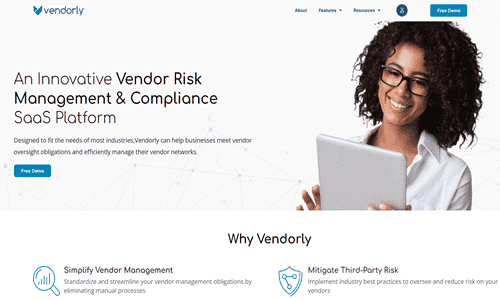
Vendorly is a comprehensive vendor management platform designed to streamline vendor due diligence, risk assessment, and performance monitoring. It offers a range of features to help businesses manage their vendor relationships effectively.
Pros:
Vendorly provides robust tools for vendor onboarding, contract management, compliance tracking, and risk assessment. Its intuitive interface and customizable workflows make it easy for businesses of all sizes.
Cons:
Vendorly’s pricing structure could seem steep to some users, especially to other vendor management tools. Furthermore, even though Vendorly has a lot of functionality, novice users could find the learning curve more challenging.
Services Provided:
Vendor onboarding, contract management, compliance tracking, risk assessment, performance monitoring, communication tools, and analytics.
Pricing Package:
Vendorly’s pricing is available upon request and may change based on the company’s demands and specifications.
Coupa
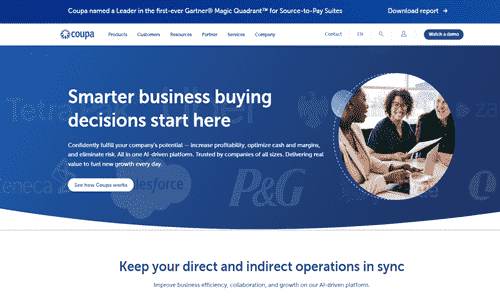
Coupa’s Vendor Management module offers complete vendor lifecycle management, from onboarding to payment processing. Its sophisticated analytics capabilities help companies maximize their vendor relationships and reduce expenses.
Pros:
Coupa has an easy-to-use interface and integrates seamlessly with other Coupa modules, including expense and procurement management. Its extensive analytics and reporting capabilities offer insightful data on expenditure patterns and vendor performance.
Cons:
Some users may find the initial setup and configuration of the Vendor Management module to be time-consuming. Furthermore, although Coupa has many functions, larger businesses with intricate vendor ecosystems may find it more appropriate.
Services Provided:
Vendor onboarding, contract management, payment processing, analytics, integration with other Coupa modules, and supplier collaboration tools.
Pricing Package:
Pricing for Coupa’s Vendor Management module is available upon request and may vary based on the scope of implementation and additional features required.
SAP Ariba
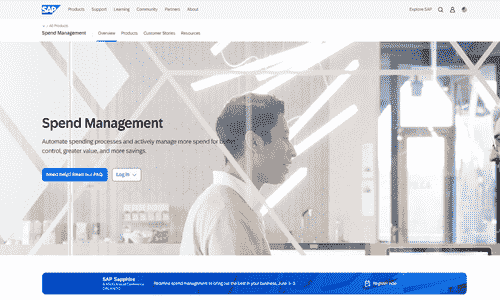
SAP Ariba offers a cloud-based procurement platform with robust vendor management functionalities. Its Supplier Management solution enables businesses to manage vendor relationships effectively, improve collaboration, and save costs.
Pros:
SAP Ariba provides a comprehensive suite of tools for vendor onboarding, contract negotiation, compliance management, and performance monitoring. Its integration with SAP ERP systems and extensive network of suppliers makes it a powerful solution for businesses.
Cons:
Some users may find SAP Ariba’s user interface complex, requiring training and support for optimal use. Additionally, while SAP Ariba offers advanced features, it may be more suitable for larger enterprises with extensive procurement needs.
Services Provided:
Vendor onboarding, contract management, compliance tracking, performance monitoring, integration with SAP ERP systems, supplier collaboration tools, and analytics.
Pricing Package:
Pricing for SAP Ariba’s Supplier Management solution is available upon request and may vary depending on the scope of implementation and additional services required.
JAGGAER
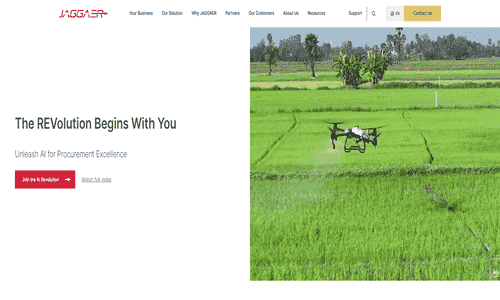
JAGGAER’s Supplier Management solution helps businesses manage vendor relationships effectively, improve collaboration, and drive cost savings. It offers a range of features for vendor onboarding, contract management, and performance monitoring.
Pros:
JAGGAER provides a user-friendly interface and customizable workflows to meet businesses’ unique needs. Its advanced analytics capabilities enable businesses to gain valuable insights into vendor performance and spending patterns.
Cons:
Some consumers might find JAGGAER’s pricing somewhat excessive when considering competing vendor management tools. Furthermore, even though JAGGAER has a lot of capabilities, it could need to be customized to meet certain corporate needs.
Services Provided:
Vendor onboarding, contract management, performance monitoring, risk assessment, analytics, and integration with other JAGGAER modules.
Pricing Package:
Pricing for JAGGAER’s Supplier Management solution is available upon request and may vary depending on the scope of implementation and additional services required.
Gatekeeper
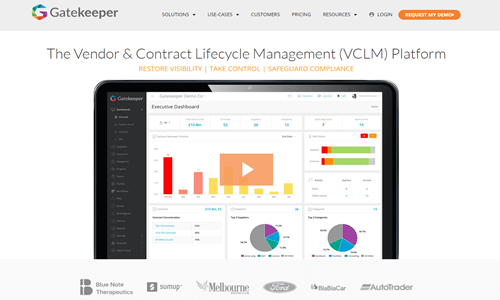
Gatekeeper is a modern vendor management platform that simplifies supplier onboarding, contract management, and compliance monitoring. It offers intuitive features to help businesses streamline their vendor management processes.
Pros:
Gatekeeper offers a customizable interface that is easy to use and adapts to organizations’ unique requirements. Because of its integration capabilities, data exchange with other systems may be done smoothly, increasing accuracy and efficiency.
Cons:
Some customers might feel that Gatekeeper’s reporting and analytics capabilities could be improved compared to alternative vendor management solutions. Furthermore, although Gatekeeper has many functions, some sophisticated business requirements could require more customization.
Services Provided:
Vendor onboarding, contract management, compliance tracking, integration with other systems, customizable workflows, and reporting.
Pricing Package:
Pricing for Gatekeeper is available upon request and may vary depending on the scope of implementation and additional services required.
How to Choose the Right Vendor Management Software:
Define Your Requirements:
Identify your organization’s specific needs, including the number of vendors, types of contracts, and regulatory compliance requirements.
Assess Features and Functionality:
Evaluate vendor management software based on key features such as vendor onboarding, contract management, performance monitoring, and integration capabilities.
Consider Scalability and Flexibility:
Select a system that can grow with your company and change to meet new needs as they arise.
Ensure Integration Capabilities:
Choose vendor management software that works in unison with your current systems, including accounting, CRM, and ERP.
Evaluate User Experience:
Prioritize user-friendly interfaces and intuitive workflows to ensure adoption and usability among your team members.
Review Vendor Reputation and Support:
Research vendor reputation, customer reviews, and support services to ensure reliability, responsiveness, and ongoing support.
Implementation and Integration:
Plan Implementation:
Provide a thorough implementation plan that includes schedules, resource allocation, and vendor management software deployment milestones.
Conduct Training:
Provide training sessions and resources to educate users on effectively using the software and maximizing its benefits.
Ensure Data Migration:
Ensure smooth migration of vendor data from existing systems to the new vendor management software, maintaining data integrity and accuracy.
Integrate Systems:
Connect the vendor management software to your current apps and systems to facilitate data interchange and process automation.
Common Challenges and Solutions:
Challenge:
Resistance to Change
Solution:
Provide comprehensive training, communication, and support to help users adapt to the new vendor management software and understand its benefits.
Challenge:
Data Silos and Integration Issues
Solution:
Implement robust integration capabilities and data management strategies to break down silos and ensure seamless data exchange between systems.
Challenge:
Compliance Risks
Solution:
Implement automated compliance monitoring tools and workflows to guarantee compliance with legal standards and reduce compliance risks.
Challenge:
Poor Vendor Performance
Solution:
Establish clear performance metrics, provide regular feedback to vendors, and implement performance improvement plans to address issues proactively.
Future Trends in Vendor Management Software:
Artificial Intelligence (AI) Integration:
AI will be a major part of vendor management software, allowing automated decision-making, tailored suggestions, and predictive analytics. AI algorithms will analyze massive volumes of data to spot trends, predict vendor performance, and streamline the vendor selection procedure.
Blockchain Technology Adoption:
Blockchain technology will enhance transparency, security, and trust in vendor transactions and contracts. Smart contracts on blockchain platforms will automate contract execution and payment processes, reducing the risk of fraud and disputes.
Enhanced Collaboration Tools:
Vendor management software will incorporate advanced collaboration features such as real-time messaging, document sharing, and task management. These tools will facilitate seamless communication and collaboration between businesses and their vendors, improving efficiency and productivity.
Focus on Sustainability and Ethical Sourcing:
Sustainability and ethical sourcing will become increasingly important in vendor management software. Businesses can make more ethical purchasing decisions using tools that track and assess vendors’ environmental, social, and governance (ESG) activities.
Mobile Accessibility and IoT Integration:
Vendor management software will become more accessible via mobile devices, allowing users to manage vendor relationships. Additionally, integration with Internet of Things (IoT) devices will enable real-time monitoring of vendor performance, supply chain logistics, and product quality.
Regulatory Compliance Automation:
Vendor management software will increasingly automate regulatory compliance processes. Solutions will offer built-in compliance checks, automated reporting capabilities, and audit trails to ensure industry regulations and standards compliance.
Data-driven Decision Making:
Advanced analytics and reporting capabilities will empower businesses to make data-driven decisions in vendor management. Predictive analytics models will identify trends, risks, and opportunities, enabling proactive vendor management strategies and optimization of vendor relationships.
Integration with Supply Chain Management Systems:
End-to-end visibility and control over the procurement process will be made possible via integration with supply chain management systems. Procurement procedures will be streamlined, and supply chain efficiency will be increased through seamless data interchange between vendor management software and supply chain systems.
Frequently Asked Questions (FAQs):
What is Vendor Management Software (VMS), and why is it important for businesses?
VMS is a centralized platform that helps businesses oversee their relationships with suppliers, vendors, and contractors. It streamlines vendor onboarding, contract management, and performance evaluation processes, ensuring transparency, efficiency, and compliance in vendor relationships.
What are the key features to look for in Vendor Management Software?
Key features include vendor onboarding and registration, contract management, performance monitoring, communication tools, invoice processing, risk management, and compliance tracking.
How does Vendor Management Software benefit businesses?
VMS enhances efficiency, cost savings, vendor relationships, risk management, compliance assurance, and data-driven decision-making.
What are the different types of vendor management software available on the market?
Types include basic VMS, enterprise platforms, industry-specific solutions, open-source software, modular solutions, and legacy systems.
How can businesses choose the right Vendor Management Software for their needs?
Businesses should define their requirements, assess features and functionality, consider scalability and flexibility, ensure integration capabilities, evaluate user experience, and review vendor reputation and support.
What are the common challenges businesses face when implementing Vendor Management Software, and how can they overcome them?
Common challenges include resistance to change, data silos, integration issues, compliance risks, and poor vendor performance. Solutions include comprehensive training, integration strategies, compliance automation, and performance management initiatives.
Conclusion:
In conclusion, vendor management software is essential for improving vendor relationships, streamlining procedures, and guaranteeing compliance in today’s complicated business environment. With many features, advantages, and upcoming developments, VMS enables businesses to improve productivity, cut costs, and increase transparency in their vendor management procedures. Companies may successfully manage their vendor ecosystems and promote long-term growth by strategically selecting the appropriate VMS solution, resolving shared issues, and keeping up with new developments.




